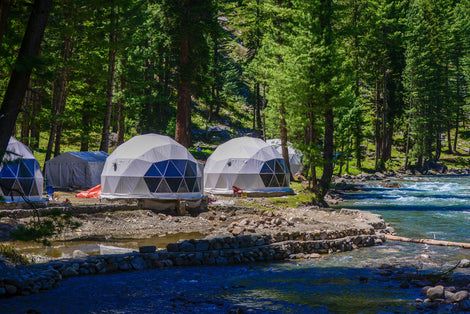Temperature Regulation Issues in Off-Grid Refrigeration
Keeping the temperature steady in an off-grid refrigerator can be a challenge. These systems don’t run like traditional units you’d find in a kitchen connected to the grid. Most off-grid fridges rely heavily on solar energy, battery storage, and smart system design to work right. Any shift in weather, power supply, or how you use the fridge can throw off its cooling performance.
One of the most common concerns with off-grid refrigeration is temperature regulation, especially with compact models like the ICECO fridge freezer. Users often face inconsistent temperatures, items freezing when they shouldn’t, or spoilage due to uneven cooling. These problems usually come down to a mix of solar system limitations and everyday user habits. The good news is that most of these issues can be avoided or fixed with the right steps and routine care.
Understanding Temperature Regulation in Off-Grid Refrigeration
Off-grid refrigerators are designed to run on renewable energy sources, especially solar. Instead of pulling power from utility lines, they depend on solar panels that charge a battery bank. This stored power then fuels the fridge during the day and night.
Here’s what affects how well your off-grid fridge keeps things cool:
- Power consistency: If your batteries aren’t charged enough because of cloudy weather or poor solar positioning, the fridge might struggle to maintain a low temperature.
- Battery quality and size: The type and number of batteries you use affect how much backup power your system has during the night or when the sun isn’t shining.
- Inverter load handling: If your inverter isn’t matched properly to your fridge’s power needs, it may cut power or fluctuate, causing poor cooling.
- Solar input: The placement and orientation of your solar panels can impact how much energy you get throughout the day.
Balancing solar energy input and power usage is key to keeping your fridge running without interruptions. One common mistake is believing the system will always self-regulate. In reality, good planning and maintenance are necessary to prevent food spoilage or appliance strain.
Solar setups work best when panels get full sun and energy is stored in batteries that are in top condition. If any part of this setup underperforms, your fridge might start to struggle. And once that cooling process is off track, temperature swings become more noticeable.
Common Temperature Regulation Issues
It’s easy to blame the fridge when it stops keeping your food cold, but problems with off-grid setups usually come from several small and preventable missteps. Here are a few common issues to keep an eye on:
1. Inconsistent Cooling
The fridge doesn’t keep a steady temperature throughout the day or night. This often stems from solar charging issues. If cloudy weather limits production and your system can’t keep batteries full, temperatures will rise overnight.
2. Overloading the Fridge
Stuffing your ICECO fridge freezer full makes it harder for air to circulate evenly. Cold spots become too cold, and other spots stay too warm. That imbalance makes chilling your groceries more difficult.
3. Poor Insulation
Air leaks through worn door seals or thin walls raise the internal temperature. Your fridge then uses more energy to cool down, draining batteries faster. Even small gaps can cause steady power loss over time.
4. Frequent Opening and Closing
Every time you open the fridge, you lose precious cold air—and warm air gets in. This affects both your food and your batteries, especially if you’re opening it often during hot weather.
5. Solar Power Gaps
If your solar array is too small or can’t meet the power load during long stretches without sunny skies, your battery reserves won’t last overnight. Power cuts can trigger temperature swings that risk spoilage.
Imagine running your fridge on a small battery bank, and the sun is nowhere to be found for two or three days. If your reserve can’t hold, you’ll end up with barely cool food by day three. That tells you it’s time to expand your system or tweak your usage.
Recognizing these patterns early is key. Minor changes can often prevent most problems before they affect your food. The goal is to build a setup that helps your fridge work with you, not fight against unpredictable conditions.
Effective Solutions For Temperature Regulation
If your ICECO fridge freezer isn’t cooling evenly, a few simple fixes might make a big difference. Often, it’s not one big issue but many small habits or details that can be improved. How and where you place the unit matters more than many people think.
Try these practical tips to get more consistent performance:
- Place it on a stable, shaded surface. Avoid placing it in direct sunlight or near heating sources. Indoor shaded spots with plenty of airflow work best.
- Balance your load inside the fridge. Don’t stack items too tight. Let air move around freely and avoid blocking fan vents.
- Use fridge thermometers. A small battery-powered thermometer helps you monitor performance and catch problems early.
- Defrost regularly. Frost reduces cooling ability and wastes power. If there’s any ice buildup inside, take time to defrost and clean the coils.
- Add insulation. If the room or storage area is hot, wrapping the outside in extra insulation can reduce energy use and help it stay cooler.
Routine cleaning checks are just as important. Dust can collect around the coils and air vents. Use a soft brush or vacuum attachment to clean these areas regularly. Look at door seals and latches too—when they're cracked, loose, or dirty, cold air sneaks out.
It might also make sense to keep a small backup battery or boost your solar input. That way, during cloudy spells or back-to-back overcast days, your fridge doesn’t lose power overnight. Even a reliable unit like the ICECO depends on steady energy to stay consistent.
Maintaining an Efficient Off-Grid Refrigeration System
Maintenance doesn’t have to take a lot of time. A few small checks each week and seasonal adjustments keep things running without interruptions. Thinking ahead helps reduce headaches later.
Here’s a simple maintenance routine:
- Weekly: Track your battery’s voltage, check the inverter output, and glance at the fridge temperature. Wipe off dust from solar panels and make sure they’re facing the right way.
- Seasonal:
- In winter, make sure your battery bank stays above freezing to prevent charge loss.
- In summer, allow gentle airflow around the fridge to prevent overheating.
- Adjust the fridge’s temperature setting by season. Keep it a bit warmer if barely used, lower it during hotter months or heavy use.
As your usage patterns change throughout the year, so should your approach. Summer camping trips or weekend guests may increase how often the fridge is opened, which affects power draw. Plan for spikes like this by expanding your array or adding a storage battery if needed.
Some people track power usage with a display or mobile app to spot patterns. If too much power drains overnight, you'll want to know before it affects the food. Awareness goes a long way in protecting your energy supply and your groceries.
Simple Habits That Keep Your Cooling Steady
A refrigerator that holds steady temps is a big part of success in off-grid living. But it only works if your whole system is set up to support it. From solar panel placement to inverter quality and fridge habits, everything plays a part.
If you’re serious about off-grid living, staying careful about small details really pays off. Items like insulation tweaks, reduced strain on batteries, and keeping things clean can stretch the life of both your gear and supplies.
When your fridge runs smoothly without hiccups, the rest of your setup feels more dependable too. It gives you one less thing to worry about. Building smart routines around temperature stability is a simple way to keep your ICECO fridge freezer working for the long haul. With the right setup and attention, your fridge can stay cold no matter the season.
If you're ready to get more reliable performance out of your off-grid system, a properly designed solar setup can make all the difference. Adding the right support for your ICECO fridge freezer helps prevent power dips and keeps your food cold no matter the weather. Let Green Vista Living help you find the solar kit that fits your needs best.







